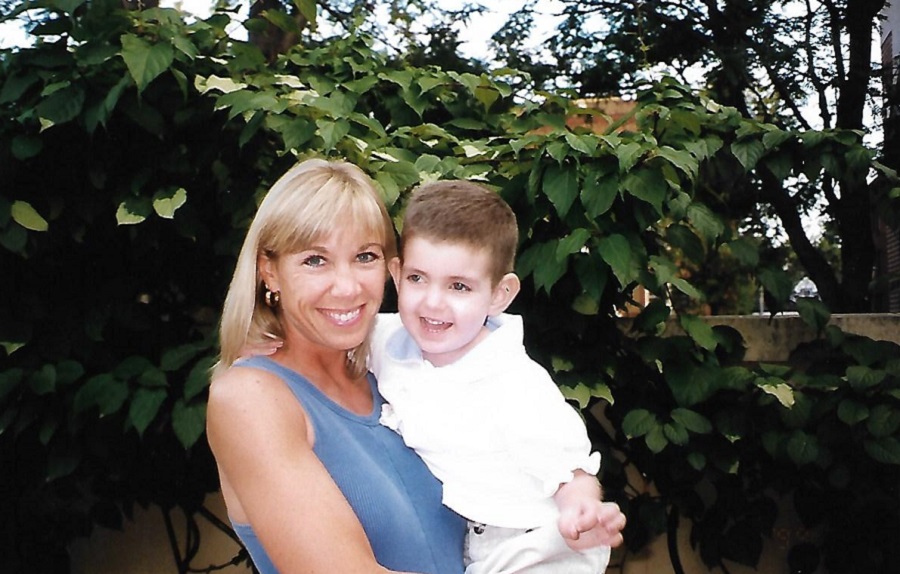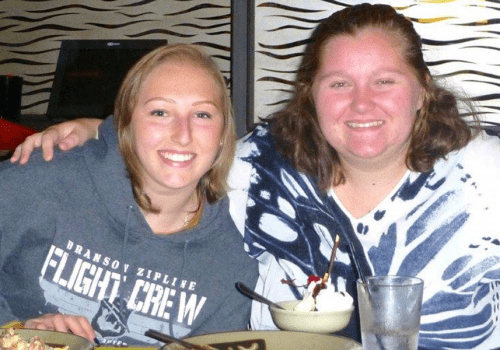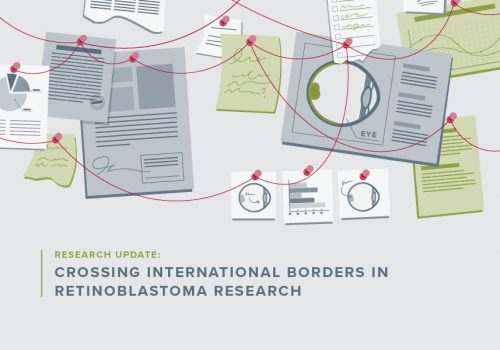(Above): Angie with Catherine in 1998, when Catherine was in treatment for cancer.
Very few people understand just what a family goes through while their child is battling cancer – the intense ups and downs, the loneliness, the stress of fighting a scary disease in an unfamiliar place. It’s a small community made up of only those who have seen it, up close. Angie Dahl is one of those people.
Angie now works at the American Society for Blood and Marrow Transplantation, but early in her career, she volunteered as a Care Partner at the University of Minnesota Masonic Children’s Hospital. She remembers first hearing about the Care Partners program when she was a part of a group for young professionals. A doctor from the hospital spoke to her group about what families go through when they come from other parts of the country to receive a bone marrow transplant, an often risky procedure that requires a long hospital stay. She told them about what Care Partners can do to help these families, who often feel lonely, fighting cancer far from home.
“I just thought, I have to do that,” Angie said. “When I was young I thought I could save the world. When I got a little bit older I realized I can’t save the world, but if I can make a difference for one family, that’s what I need to be doing.”
As part of the Care Partners program, Angie’s job was to be a supportive presence for families of pediatric hematology/oncology and blood or marrow transplant patients receiving care at the hospital. Volunteers like her provide the kind of care that doctors or nurses can’t –they run errands, pick up groceries, play games or watch movies with kids and give valuable advice to parents. Cheryl, whose daughter Catherine received a bone marrow transplant in 1998, remembers Angie clearly, more than 20 years later.
“Angie would stay with Catherine so my husband and I could go grab some food or go grocery shopping or do laundry together,” Cheryl said. “She would tell us what parks to visit on the days we weren’t in the hospital, and she would help us find where we could get the foods we were craving from home. The doctors are there to save your life, but people like Angie make life worth living.”
Angie understands how important it is for parents to have a supportive shoulder to lean on during difficult times. She’s thankful that she hasn’t had to face childhood cancer in her own family, but having a front-row seat to the suffering and strength of these families has changed her perspective on life. She remembers a conversation she had with a parent once, when she told him how sorry she was for not calling him back right away – work had just been so busy that day. He told her he would give anything for a busy day at work, because it would mean a distraction from his son’s daily struggle.
“My heart just broke for him in that moment,” Angie said. “I’ve watched the real suffering of parents who have no control, who just have to sit back and watch their child struggle, with no distractions. So any time I have a busy day at work or I’m not feeling well, I sit back and remind myself how lucky I’ve been and how it’s a privilege to give back.”
Angie’s time as a Care Partner undoubtedly changed the course of her life – she says she wouldn’t be where she is in her career today had she not decided to become a Care Partner 20 years ago. But one of the things Angie loved most was the opportunity the program gave her to form lifelong friendships. She is still in touch with Catherine and Cheryl 20 years after Catherine’s bone marrow transplant, and she loves going to the graduation parties and weddings for kids she first met during some of their darkest moments.
“I love the success stories of these kids who have been through so much, and are now getting to go on with life and do normal things,” Angie said. “My second care partner just got married in January, and he invited me to the wedding.”
Through the struggles and successes, Angie says one thing she always notices is when parents are hesitant to ask for help. Sometimes they don’t even really know what they need, and sometimes they are afraid of being a burden to others. Angie’s advice to childhood cancer families now is to take advantage of any support resources that are available, and never be afraid to ask for help.
“People want to help - give people the opportunity to support you through this process,” Angie said. “Your friends want to help you, and if you give them something to do that takes a little bit of your stress away, it makes them happy. Helping people isn’t a burden - it’s a privilege, an honor and a blessing.”
Become a Care Partners Volunteer
Care Partners volunteers provide nonmedical support to families receiving care at the University of Minnesota Masonic Children’s Hospital. Learn more about how you can become a Care Partners volunteer.




